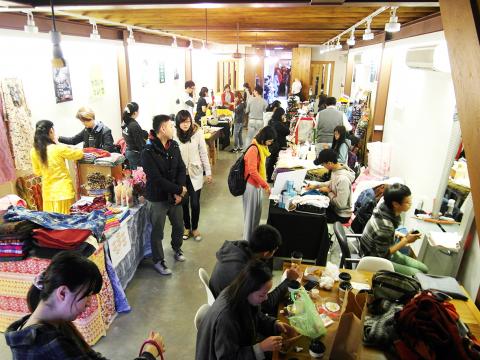What comes to mind when someone says, “join us and be a unicorn?”
According to Sidney Hsu (徐令軒), it’s veganism.
“A unicorn is a peaceful, grass-eating animal,” Hsu, founder of the Taipei Vegan Frenzy fair, says. “It is an animal that reminds me of rainbows and harmony, and it’s pretty.”

Photo courtesy of Sidney Hsu
Fantasy aside, Hsu chose the mythical animal as a mascot for the event, which in Chinese is caoshou paidui (草獸派對, grass beast party), because she did not like directly using the word su (素, vegetarianism).
“People often connect that word to religion,” Hsu says. “I don’t have a religious background. I just don’t like using animals. It is a more peaceful lifestyle.”
The three-day fair, which features 35 vegan-friendly vendors and live music, takes place from today to Sunday at Meimen Arts and Ethics Academy (梅門德藝天地).
Hsu says that veganism is more than just a dietary choice, evidenced in the variety of the 35 vendors, which include clothing, skin care products and even tattoo art.
“Excluding the use of any animals or byproducts is a lifestyle,” she says, adding that the movement is rooted in equality, animal rights and the freedom to live.
Many products featured at the fair are not what one would typically expect vegans to need to watch out for. For example, most varieties of Guinness beer are currently not vegan because although the beverage itself contains no animal products, it uses a fish bladder-derived product in its clarification process. Hsu says Heineken and Corona are vegan-friendly, and Guinness just announced last November its plans to forgo the fish process and join the club.
Tattoos are another surprising item. Hsu says the ink often contains pig bone products or gelatin to make them last longer. Vegan tattoos start fading earlier — but at least they do not use animals, she says.
Hsu says the fair’s original idea was to provide resources for other vegans, but after seeing the reaction of passersby, she thought it could also be an educational tool to let people know that there are many products that could be animal-free, and also to let them understand what veganism is.
“In the West, even in places with few vegetarians, when you tell people you’re vegan they more or less know what you can and can’t eat,” she says. “It’s very hard to explain to people in Taiwan. I want it to become something that society is aware of.”

May 11 to May 18 The original Taichung Railway Station was long thought to have been completely razed. Opening on May 15, 1905, the one-story wooden structure soon outgrew its purpose and was replaced in 1917 by a grandiose, Western-style station. During construction on the third-generation station in 2017, workers discovered the service pit for the original station’s locomotive depot. A year later, a small wooden building on site was determined by historians to be the first stationmaster’s office, built around 1908. With these findings, the Taichung Railway Station Cultural Park now boasts that it has

Wooden houses wedged between concrete, crumbling brick facades with roofs gaping to the sky, and tiled art deco buildings down narrow alleyways: Taichung Central District’s (中區) aging architecture reveals both the allure and reality of the old downtown. From Indigenous settlement to capital under Qing Dynasty rule through to Japanese colonization, Taichung’s Central District holds a long and layered history. The bygone beauty of its streets once earned it the nickname “Little Kyoto.” Since the late eighties, however, the shifting of economic and government centers westward signaled a gradual decline in the area’s evolving fortunes. With the regeneration of the once

In February of this year the Taipei Times reported on the visit of Lienchiang County Commissioner Wang Chung-ming (王忠銘) of the Chinese Nationalist Party (KMT) and a delegation to a lantern festival in Fuzhou’s Mawei District in Fujian Province. “Today, Mawei and Matsu jointly marked the lantern festival,” Wang was quoted as saying, adding that both sides “being of one people,” is a cause for joy. Wang was passing around a common claim of officials of the People’s Republic of China (PRC) and the PRC’s allies and supporters in Taiwan — KMT and the Taiwan People’s Party — and elsewhere: Taiwan and

Even by the standards of Ukraine’s International Legion, which comprises volunteers from over 55 countries, Han has an unusual backstory. Born in Taichung, he grew up in Costa Rica — then one of Taiwan’s diplomatic allies — where a relative worked for the embassy. After attending an American international high school in San Jose, Costa Rica’s capital, Han — who prefers to use only his given name for OPSEC (operations security) reasons — moved to the US in his teens. He attended Penn State University before returning to Taiwan to work in the semiconductor industry in Kaohsiung, where he